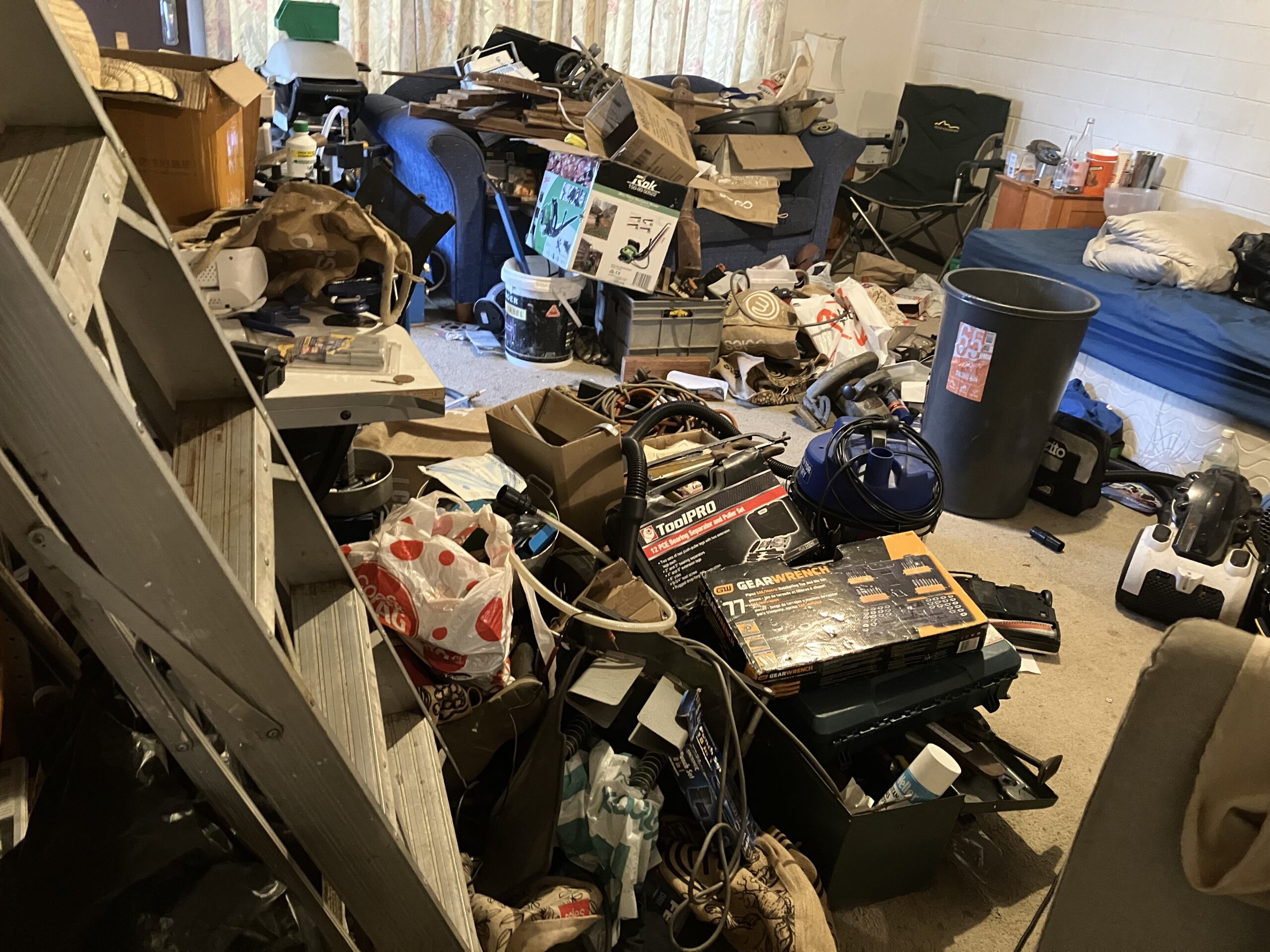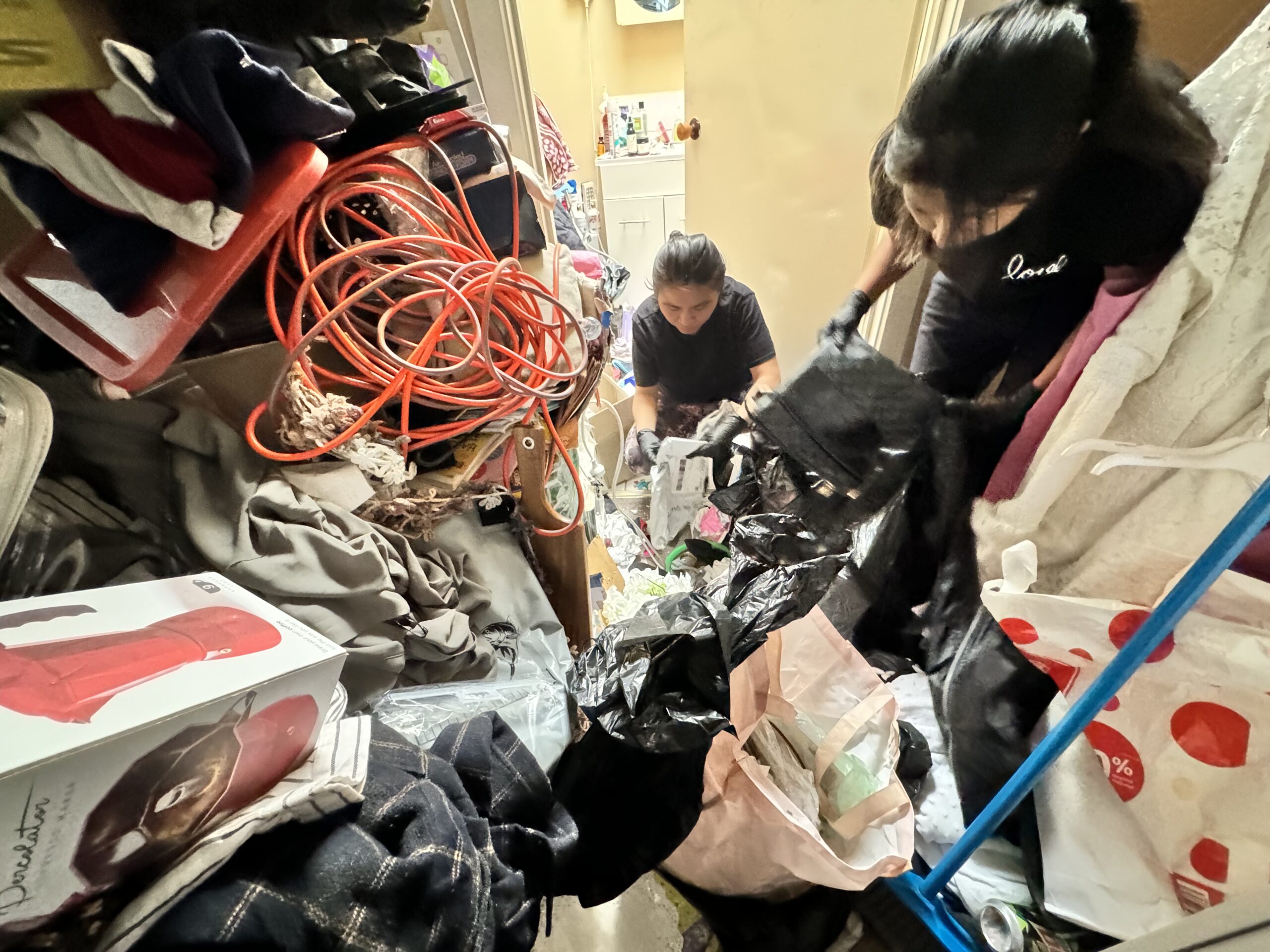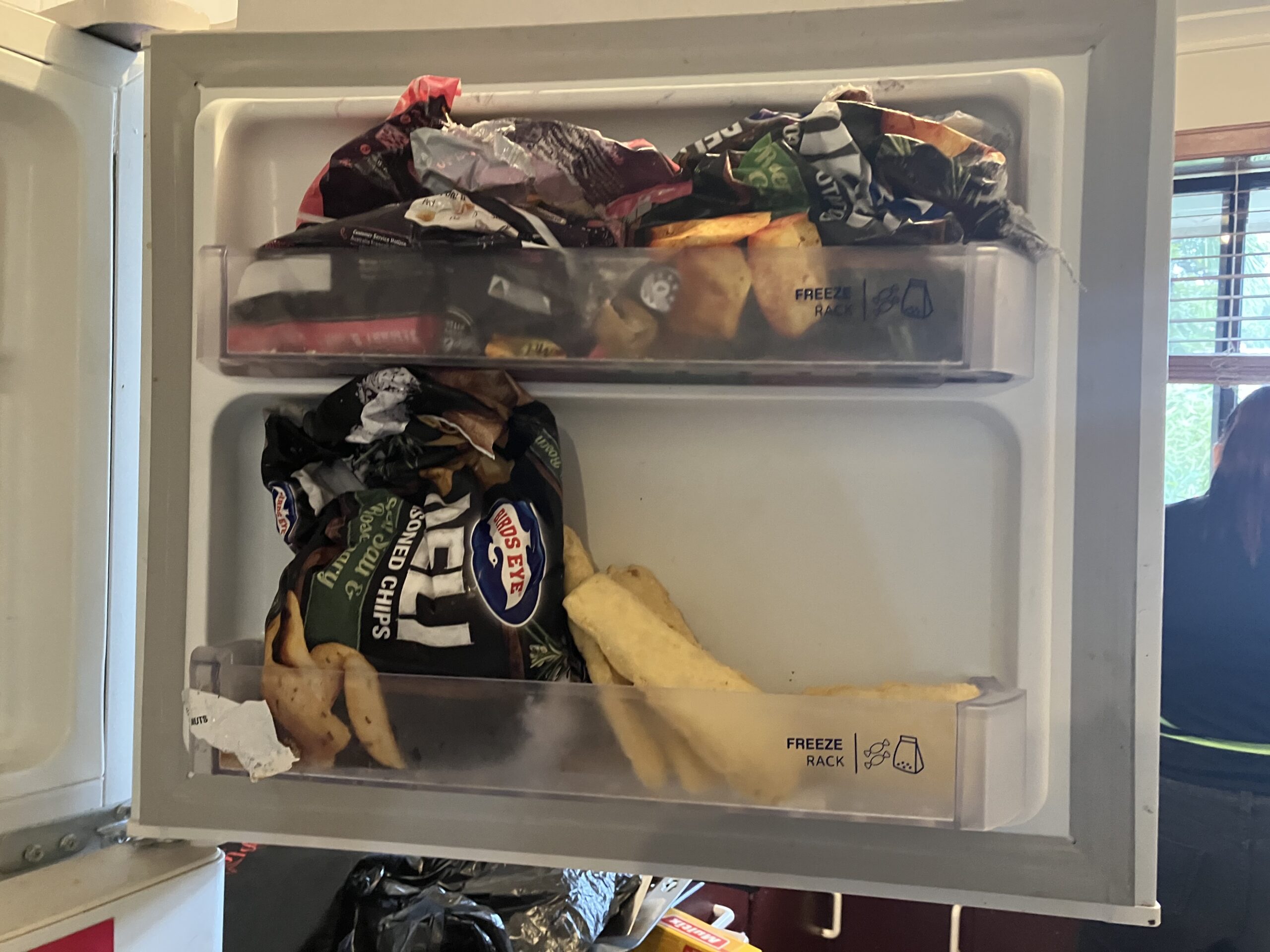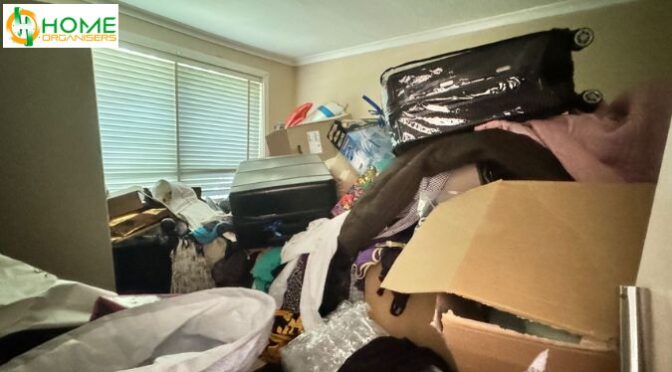For many people, clutter is more than just a mess. It can slowly grow until it becomes a serious problem, impacting not only the look of a home but also a person’s health, safety, and even their ability to stay in their home.
This blog will walk you through the clear signs that your client may need help with decluttering before things get worse. Whether you’re a support worker, case manager, family member, or friend, knowing the early signs can help protect your client’s mental health, home, relationships, and even their income.
Let’s explore what to look for, and why timely support makes all the difference.
1. The Link Between Clutter and Eviction
Sometimes, clutter builds up slowly: a few extra bags in the hallway, a pile of unopened mail, dishes in the sink that never get done.
But over time, these things can lead to:
- Missed inspections
- Health and safety hazards
- Angry neighbours
- Property damage
- Fines or official warnings
Eventually, if nothing changes, a person could receive a formal eviction notice. This is a clear housing risk.
Eviction is stressful and life-changing. But the good news is: it can often be avoided with the right help at the right time.

2. Early Signs Your Client Needs Decluttering Help
Let’s look at the signs that your client may be heading towards trouble.
Missed Inspections or Avoiding Access
If your client keeps cancelling or avoiding property inspections, it’s worth checking in. They may feel embarrassed about the state of their home or overwhelmed by the idea of cleaning it up. Avoiding access can also be seen as a breach of their rental agreement.
Overflowing Rubbish or Too Much Stuff
Are the bins full? Is there rubbish sitting inside the home for weeks? Are there items everywhere—on the floor, couches, beds—making it hard to move around?
This can be a sign your client can’t keep up with the cleaning, or that they’re emotionally attached to things and struggling to let go.
Rooms Not Used for Their Purpose
Sometimes, people stop using rooms the way they’re meant to be used. For example, a bedroom might be so full of clothes and boxes that there’s nowhere to sleep. A kitchen may be filled with old shopping bags, leaving no space to cook. This loss of function is a strong sign they need support.
Blocked Exits or Trip Hazards
Blocked hallways, doors that don’t open properly, or cords and items scattered on the floor can be dangerous. Falls and accidents are common in cluttered homes, especially for older adults or those with mobility issues.
Signs of Emotional Distress Around the Home
If your client seems ashamed, anxious, or upset when talking about their living space, this is another sign. People may cry, change the topic, or try to hide the reality. This usually means they feel stuck and need kind, practical help.

3. Why Decluttering Matters – More Than You Think
Decluttering isn’t just about having a neat house. A cluttered home affects almost every part of life—mental health, family relationships, physical health, safety, and more. Let’s explore how.
Mental and Emotional Health
Living in a cluttered space can make people feel stressed, anxious, and depressed. It can:
- Make the brain feel overloaded
- Increase negative thoughts
- Make people feel helpless or embarrassed
- Lead to sleep problems
People often say they feel “trapped” in their own homes. A clean, calm space makes it easier to relax, think clearly, and feel in control.
Physical Health
A messy home can lead to serious health problems, especially when food waste, dust, mould, or pests are involved. Some risks include:
- Respiratory problems from dust or mould
- Skin conditions from poor hygiene
- Illness from spoiled food or rubbish
- Increased risk of falls or injuries
Decluttering can make a home healthier and easier to clean, reducing the chance of sickness or accidents.
Family and Social Relationships
Clutter can cause tension in families. Children may feel ashamed to invite friends over. Partners may argue over mess. Parents may struggle to care for their children in a disorganised space.
For clients with children, a cluttered home could also raise concerns with child protection services. Clean, safe homes support stronger relationships and help families feel proud of their space.
Productivity and Daily Routines
When a home is filled with clutter, even simple tasks like cooking, finding keys, or folding laundry take longer. People may stop doing basic things like:
- Washing clothes
- Preparing meals
- Paying bills on time
- Getting to appointments
This can lead to more stress and loss of independence. A tidy space helps people feel ready to tackle their day.
Mood and Self-Esteem
The way a person feels about their home affects how they feel about themselves. Living in clutter can lead to:
- Low confidence
- Embarrassment
- Fear of visitors
- Feeling judged
On the other hand, walking into a clean, organised home can improve mood, bring a sense of pride, and boost motivation.
Wealth and Financial Wellbeing
Cluttered homes often lead to financial problems. How?
- Missed bills and overdue payments
- Fines from landlords or council
- Cost of replacing lost or damaged items
- Risk of losing rental housing altogether
Decluttering can prevent costly outcomes. It also helps people take control of their money again—finding unpaid bills, reducing duplicate purchases, and regaining a sense of order.
Safety and Tenancy Security
One of the biggest risks of severe clutter is eviction. Rental agreements usually include rules about maintaining the property and allowing regular inspections. If those rules are broken, the landlord can issue warnings and eventually end the lease.
By acting early and helping clients get support, these problems can often be fixed before things go too far. This is especially important for SDA tenant support or clients with NDIS funding who may be more vulnerable to housing risk.

4. Why People Don’t Ask for Help Sooner
It’s important to understand that most people don’t choose to live in clutter. Many feel stuck, ashamed, or simply don’t know where to begin. Reasons people avoid help include:
- Mental health conditions like anxiety, depression, or hoarding disorder
- Physical disabilities that make cleaning difficult
- Lack of support from friends or family
- Feeling overwhelmed by the size of the task
- Fear of judgement or losing their home
That’s why it’s so important to approach clients with empathy, not blame. A little support can go a long way.
5. How Professional Decluttering Support Helps
Sometimes a friend or family member can help clean up a small mess. But when clutter becomes a serious problem, professional help is often needed.
At Home Organisers, our team understands how complex this issue can be. We provide structured, non-judgemental support tailored to each person’s situation. This includes:
- Step-by-step plans to clear the clutter
- Sorting, organising, and removing unwanted items
- Working alongside NDIS plans, support workers, or case managers
- Focusing on safety, function, and dignity
We’re here to help people reclaim their homes—and their peace of mind.
6. When Should You Call in a Decluttering Service?
If you’re unsure whether your client needs professional support, ask yourself:
- Is the clutter affecting their health or safety?
- Have inspections been missed or failed?
- Are parts of the home no longer usable?
- Is your client anxious, embarrassed, or struggling to cope?
- Have there been warnings from the landlord or housing provider?
If you answered “yes” to any of these, now is the right time to act. Especially when clutter and eviction become a risk factor.
7. Helping Clients Say “Yes” to Support
Some clients may resist help, even when it’s clearly needed. Here are a few gentle ways to support them:
- Be honest but kind. Point out the risks without making them feel ashamed.
- Focus on their goals. Ask what they want: to stay in their home? Feel proud again? Be able to cook meals?
- Start small. Suggest one room or one box at a time.
- Offer support. Let them know they’re not alone.
- Explain the benefits. Share how decluttering can improve health, mood, and safety.
8. Final Thoughts: Prevention is Better Than Crisis
When it comes to clutter and eviction, waiting too long can lead to serious problems. But by spotting the signs early and offering the right support, you can help your client stay safe, confident, and secure in their home.
A clean home is more than a place to live. It’s a place to grow, feel calm, connect with others, and live with dignity.
If you think your client needs help, don’t wait for the eviction notice.
Need help managing clutter before it becomes a crisis?
Contact our expert team today for compassionate support and fast action.
Call: 03 8583 9103
Email: nancy@homeorganisers.com.au
Visit: homeorganisers.com.au
We’re here to support you, your clients, and SDA tenants—before clutter leads to eviction.
???? Case Study 1: Saving Marcus from Eviction and Restoring His Dignity
Client Background:
Marcus, a 42-year-old man living with schizophrenia and on the NDIS, had been in his Specialist Disability Accommodation (SDA) unit for over three years. He lived independently but gradually became overwhelmed with clutter due to depression and anxiety.
The Challenge:
His cluttered space triggered a breach notice from the housing provider. Rubbish had blocked exits, and hygiene concerns were escalating. Marcus’s support coordinator contacted us urgently, worried about clutter and eviction risks.
Our Approach:
We conducted a trauma-informed assessment and created a decluttering plan Marcus could agree to. Over several days, our team built rapport and worked side-by-side with him—clearing walkways, removing waste, and organising essentials.
We coordinated with his NDIS support team to ensure we worked within his plan budget, and regularly updated the SDA provider, easing their concerns.
Results:
- The breach notice was withdrawn.
- Marcus’s mental health stabilised, and he resumed community participation.
- His tenancy was saved—avoiding the trauma of housing risk NDIS participants often face.
Quote from Marcus’s Support Coordinator:
“I honestly believe he would’ve lost his home without your team’s quick, respectful help. He finally feels in control again.”
???? Case Study 2: Protecting Sarah’s SDA Tenancy After Years of Emotional Hoarding
Client Background:
Sarah, 57, lives in an SDA home and has a complex trauma history. Over the years, she’d developed severe hoarding behaviours. Her clutter was comforting but had grown to dangerous levels.
The Challenge:
The SDA housing provider issued a final warning, citing health and fire risks. Sarah faced an imminent eviction, and her support coordinator was desperate to find specialised SDA tenant support to intervene with care.
Our Approach:
We approached Sarah with deep empathy and patience. Our trauma-informed team gained her trust and worked across multiple sessions—sorting items with her, removing hazards, and introducing new routines to maintain her space.
We documented progress and shared it with her support network and housing provider, ensuring transparency and reducing anxiety on all sides.
Results:
- Eviction was avoided completely.
- Sarah now maintains a safe, clutter-free home with monthly check-ins.
- She says she finally feels “proud” to invite people into her space again.
Quote from Sarah:
“I didn’t think anyone could help without shaming me. Your team made me feel seen, not judged.”



